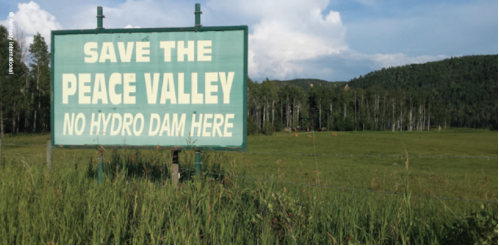Amnesty International is deeply disappointed that the BC Supreme Court has decided to allow construction of the Site C dam to continue while an ongoing Treaty rights case proceeds.
In a decision released yesterday Justice Warren Milman set out a plan to ensure that the Treaty rights case initiated by the West Moberly and Prophet River First Nations can be heard before the dam is completed and the Peace River Valley flooded.
However, despite concluding that First Nations could face “irreparable harm” from forest clearing and other preparation activities planned to take place even before the trial begins, Justice Warren Milman turned down the application by the West Moberly First Nations for a temporary injunction to protect the Valley.
In a public statement responding to the decision Chief Roland Willson of the West Moberly First Nations said, “the judgement doesn’t transform Site C into a good project” while Chief Kirk Tsakoza of the Prophet River First Nation said, “The Court may have chosen not to suspend work on the dam, but that doesn’t mean the project will ever be completed.” Both stated that their nations will continue the legal struggle.
Amnesty International Indigenous Rights Campaigner Craig Benjamin said, “The court’s decision means that the Peace Valley, the Treaty rights of the Nations who depend on that land, and even fundamental principles of justice are all at risk. It would be profoundly unjust if sacred sites and crucial wildlife habitat at the heart of this case were destroyed only to have the court later decide that the land should have been protected all along.”
The court’s decision was based largely on the principle of “balance of convenience.” The court ruled that now that construction has begun, the implications of halting such a large project outweighed the risk to Treaty rights.
“We’re concerned that the court has effectively rewarded the provincial government for having ignored Treaty rights all along,” said Benjamin. “The onus should never have been on First Nations to prove that their rights are at risk. These are rights protected in an historic Treaty, in the Constitution and in international law. The province’s decision to rush ahead with this project should not be a defense for their failure to safeguard these rights.”
Both levels of government have acknowledged that the decision to approve construction of the Site C dam was made without ever considering whether destroying this last remaining area of the Peace River Valley would violate their Treaty obligations.
While the federal government chose not to oppose the injunction application, the province has not only fought to continue construction, it also sought to convince the court of a narrow reinterpretation of Treaty rights that could lead to far-reaching harm for the people of Treaty 8 and for First Nations across Canada. Yesterday’s decision did not rule on the contending Treaty interpretations brought forward by the province and the West Moberly First Nations, or on the validity of the First Nations’ claim that Site C is an unjustifiable violation of their Treaty rights.
Benjamin said, “The arguments made by the province and BC Hydro during the injunction hearing provide a preview of the kinds of tactics they are likely to employ as the case proceeds. These efforts to deny, minimize and undermine the rights of Indigenous peoples are in sharp opposition to the Horgan government’s repeated public commitments to uphold the rights of Indigenous peoples, implement the UN Declaration on the Rights of Indigenous Peoples, and promote reconciliation.”
As the court case proceeds, Amnesty International will continue to stand with the First Nations. The organization is renewing its call for the Horgan government to honour its promises and protect the Peace Valley. Amnesty International is also encouraging everyone concerned with justice and reconciliation to follow the case as it unfolds and, most importantly, to donate to the First Nations legal defense so that West Moberly and Prophet River are not alone in carrying the responsibility of upholding the Treaty relationship.
For more information or to request an interview, please contact:
Lucy Scholey, Amnesty International Canada (English): +1 613-744-7667 ext. 236; lscholey@amnesty.ca













